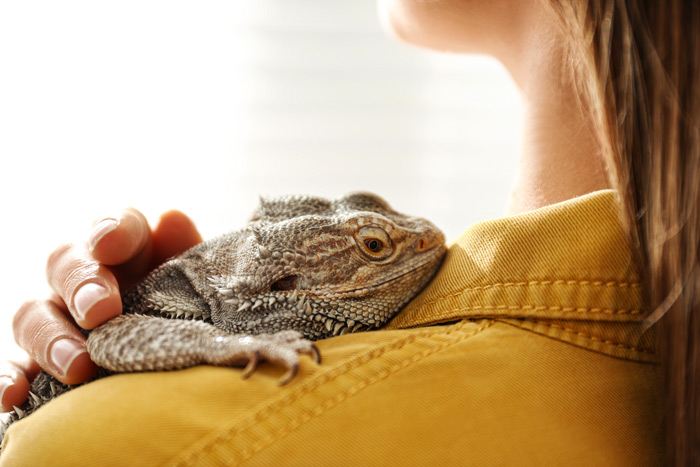When times are tough, sometimes we just don’t want to talk about it—not with our friends or family, not with our therapist or sponsor, not with our church group or 12-Step crowd. Sometimes we just want to sit quietly. But even when we want to sit quietly, sometimes we don’t want to be alone while we do it. But how many people do you know who are good at sitting silently with you under any circumstances—let alone while you are clearly upset?
Odds are, not very many.
This is where the furry—and not-so-furry—friends in our life can be a real comfort. Sometimes you just need to sit with your dog or your cat (assuming they will deign to sit with you) or your rabbit or your bird or even your lizard. No matter what kind of pet you may prefer, their presence can be very comforting without being demanding.
The connection between person and pet benefits almost anyone—and can be particularly helpful for a person in recovery for a substance use disorder. Let’s take a look at some of the benefits as well as some alternatives if having an animal at home isn’t right for you.
Get Pet Benefits to Support Your Recovery
Having a pet can be a positive experience in a number of ways. For example, pets provide steady companionship, which means they can help you keep loneliness at bay. Loneliness can be particularly challenging for a person in recovery, so a reliable friend who is always available can be a powerful source of support for your ongoing sobriety.
Similarly, interacting with your pet can be an excellent way to fight boredom and the cravings for drugs and alcohol that often accompany it. Whether your pet is extremely energetic or a little bit lazier, it is pretty likely they can hold your attention and keep you busy. Part of that busyness, of course, stems from the need to care for your animal friend—and that sense of caring for someone else can also support your recovery. Scooping poop or changing litter may not seem like a recovery-supporting activity, but in fact all aspects of taking care of an animal can boost your feelings of self-worth while also shifting your focus from yourself and your thoughts.
Some pets—dogs most notably—are also excellent motivators when it comes to getting the exercise that can be so helpful to your physical and mental health. Taking your dog for a daily walk is a great start to a new exercise program.
In the end, however, you might find that the biggest benefit of animal companionship is just an ongoing sense of comfort. Spending time with an animal has been shown to lower blood pressure and oxytocin levels in the brain, which means you will feel less stressed and more relaxed. Reducing stress and anxiety is essential for someone in recovery, so the calming influence of a pet can have significant, lasting benefits.
Options for Overcoming Pet Barriers in Recovery
Maybe it might be difficult to welcome a pet into your home. Maybe you have prohibitive allergies. Maybe you worry about the added expenses that come with food, supplies, check-ups, and the like. Maybe you live with someone who simply doesn’t care for animals or who has a longstanding fear of them. You might live someplace that doesn’t allow animals or that is too small.
Or you might simply feel like you are not in place mentally to take on the challenges of caring for an animal. After all, having a pet is a huge responsibility. You become wholly responsible for the animal’s well-being. Ideally, the boost to your own well-being is a fair trade for the care the animal requires, but not everyone may feel equipped to take on that responsibility.
In any of these cases (except, perhaps, for the allergies), you can still get some of the benefits of spending time with animals in other settings. For example, you might spend time—or even volunteer—at the St. Louis Zoo, one of the country’s most impressive zoos and home to more than 13,000 animals. You could also volunteer at an area shelter, spending time with animals awaiting adoption and making sure they are well cared for. This sort of service can confer many of the same benefits you might experience by having a pet at home—but with fewer ongoing responsibilities.
Home or Away, Animals Can Be Great Friends
Whether you bring a pet into your home or find opportunities to interact with animals in other settings, you can forge bonds that will benefit your recovery. And the great news is that the animal will benefit from those bonds as well. The relationships between animals and humans can be impressively powerful and make the lives of both parties much more fulfilling.
Before the Pet: Get the Help You Need
If you are struggling with a substance use disorder, the steadfast companion who most needs your help is you. You can’t care for others—humans or animals—if you can’t care for yourself. At The Aviary Recovery Center we are devoted to helping you get back on your feet so that you can take the first steps of your recovery journey with confidence and plenty of support. Soon enough, you may find that you would like to have a pet walking that recovery path with you. The perfect pet is probably out there waiting, so let’s start your journey to sobriety right away.
(314) 464-0222. We’re here to help.










